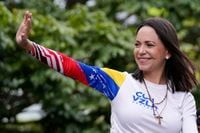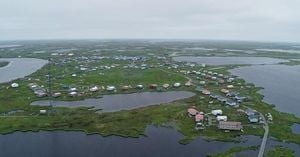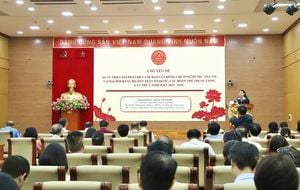On October 17, 2025, the world watched as María Corina Machado, a prominent Venezuelan opposition leader, was awarded the Nobel Peace Prize. The Norwegian Nobel Committee lauded her as "one of the most extraordinary examples of civilian courage in Latin America in recent times," recognizing her lifelong struggle for democracy in the face of the repressive regime led by Nicolás Maduro. But if anyone expected this honor to unite Latin America—or even the international community—in celebration of democratic resistance, the aftermath told a far more complicated story.
According to CBC, the Nobel Committee awarded Machado for her "struggle to achieve a just and peaceful transition from dictatorship to democracy" in Venezuela. This recognition came at a time when the United States, under President Donald Trump, was ramping up pressure on Maduro’s government. The U.S. had recently deployed naval forces near Venezuela and conducted strikes against alleged drug traffickers, resulting in 27 deaths—a policy Machado herself called "courageous" and "visionary." In a move that raised eyebrows across the region, Machado publicly dedicated her Nobel win to Trump, citing his "decisive support" for the Venezuelan democratic opposition.
Machado’s dedication was not just a gesture of gratitude; it was a calculated political move. As reported by The Times of Israel, Machado had also reached out to Israeli Prime Minister Benjamin Netanyahu, expressing her appreciation for Israel’s actions in the war against Hamas and acknowledging the shared struggle against the "Iranian axis of evil," which she argued threatened both Israel and Venezuela. Netanyahu, in turn, congratulated Machado and praised her commitment to democracy and world peace. In a separate interview, Machado even suggested that Trump deserved to win the Nobel Peace Prize next year, underscoring her alignment with the U.S. administration’s approach to Venezuela.
President Trump’s relationship with Venezuela has been anything but subtle. During his first term, he imposed aggressive sanctions on Maduro’s regime, starting in August 2017 and escalating further in early 2019 after what many viewed as a rigged presidential election in 2018. When sanctions failed to dislodge Maduro, Trump reportedly considered military options, including a potential blockade. These hardline tactics were interrupted when Joe Biden took office in 2021. Biden’s administration sought dialogue with Maduro, leading to the Barbados Agreement in October 2023—a deal intended to pave the way for democratic elections in 2024 and accompanied by a temporary easing of oil sanctions.
Yet, as BBC and CBC both noted, the optimism surrounding the Barbados Agreement quickly faded. Despite international guarantees, Maduro’s government banned Machado from running in the 2024 election. The vote itself, widely condemned as fraudulent, forced Biden to reinstate sanctions. One Venezuelan expert called it “the largest electoral fraud in Latin America’s history.” As a result, Trump let most of Biden’s oil licenses lapse and kept the world guessing about his next move, especially after the U.S. naval deployment near Venezuela.
Machado’s Nobel win, then, became a lightning rod for political controversy. While right-wing leaders in Latin America celebrated her achievement, many on the left responded with silence, criticism, or outright condemnation. As Daniel Batlle wrote in The Hudson Institute series, authoritarian leaders like Cuba’s Miguel Díaz-Canel predictably denounced the award. Mexico’s President Claudia Sheinbaum dodged the issue, citing Mexico’s tradition of noninterference, while Brazil’s President Luiz Inácio Lula da Silva and his adviser Celso Amorim accused the Nobel Committee of politicizing the prize. Colombia’s Gustavo Petro initially offered lukewarm congratulations but later questioned Machado’s foreign alliances, particularly her outreach to leaders like Netanyahu, and called for renewed national dialogue in Venezuela.
Guatemala’s leftist President Bernardo Arévalo stood out as a rare exception, publicly congratulating Machado. Uruguay’s Yamandú Orsi suggested it might have been better not to award the prize at all this year. Chile’s President Gabriel Boric remained silent, though his foreign minister did issue a congratulatory note. This patchwork of reactions, as highlighted by The Hudson Institute, exposed the deep ideological rifts running through Latin America. For many leftist leaders, principles such as sovereignty and noninterference appeared to outweigh solidarity with democratic movements—especially when those movements aligned with the U.S. or criticized fellow leftist governments.
Criticism of Machado has not been limited to her political alliances. Some have questioned her support for U.S. sanctions and military pressure, arguing that such measures have contributed to Venezuela’s humanitarian crisis. Yet, as Batlle observed, these critiques often ignore the Maduro regime’s far graver abuses: the imprisonment of nearly 2,000 dissidents after the July election, systematic torture documented by human rights organizations, and the forced exile of 8 million Venezuelans. In 2023, Lula even claimed that democracy was "thriving" in Venezuela and dismissed the “narrative of authoritarianism” against Maduro—despite evidence of banned opposition candidates, shuttered independent media, and widespread repression.
For Machado, the Nobel Prize is more than a personal accolade. As she told the BBC, the honor felt "like an injection" for her movement, boosting its legitimacy and morale at a time when regional support was flagging. She has made it clear that governments must choose "to be with the people of Venezuela or with a narco-terrorist cartel"—a stark dichotomy that reflects both the gravity of Venezuela’s crisis and the international stakes involved.
As the dust settles, it is clear that Machado’s Nobel win has intensified rather than bridged the ideological divides in Latin America. Her alignment with Trump and other Western leaders has won her powerful allies but left her isolated among many of her regional peers. The episode has also reignited debates about the purpose and politics of the Nobel Peace Prize itself, with critics accusing the Committee of favoring political agendas over impartiality. Yet, for Venezuela’s embattled opposition, the prize represents a rare moment of global recognition—and perhaps, a new opportunity to rally international support against authoritarianism.
In the end, the story of María Corina Machado’s Nobel Peace Prize is not just about one woman’s courage, but about the enduring struggle for democracy in a region riven by ideological fault lines. Whether the prize will help tip the balance remains to be seen, but for now, it has thrown a spotlight on both the promise and the perils of fighting for freedom in the Americas.




